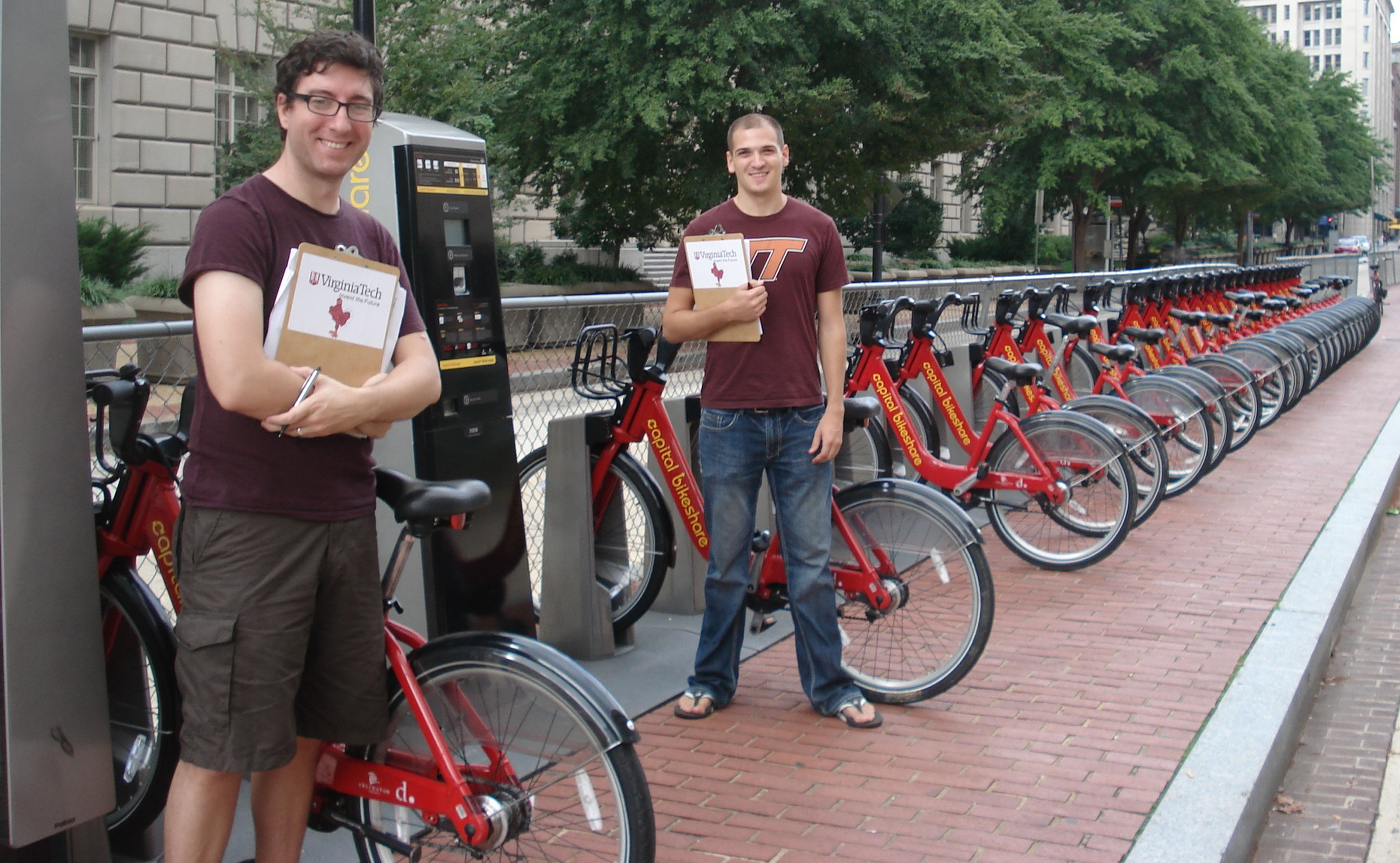Graduate students in urban affairs and planning conduct study for Capital Bikeshare

Eleven graduate students in an Environmental Planning Studio taught by Ralph Buehler, assistant professor, Department of Urban Affairs and Planning,Virginia Tech National Capital Region, have completed a study of 340 short-term users of Capital Bikeshare, currently the largest bike sharing service in the United States.
The study is intended to provide Capital Bikeshare with a better understanding of short-term users who purchase either a 24-hour or five-day pass and to help the bike sharing service better focus its efforts to increase ridership and improve functionality.
Capital Bikeshare provides a fleet of more than 1,100 distinctive red bicycles at 114 stations in Washington, D.C., and Arlington County, Va. The bicycles are available 24 hours a day, 365 days a year; users check out and return bikes at any of the stations where the system operates. Alta Bicycle Share, Portland, Ore., is responsible for the maintenance, operation, and balancing of Capital Bikeshare bicycles and stations through a contract with the Washington, D.C., Department of Transportation and Arlington County Commuter Services.
“While Capital Bikeshare had been successful in generating detailed demographic profiles of both its annual and monthly system subscribers, it had not yet gathered adequate profiles of short-term users when Virginia Tech was asked to glean the first in-depth look into the makeup and characteristics of this more casual group,” said Buehler. "This provided a perfect opportunity for our Environmental Planning Studio as alternate modes of transportation is a significant issue for us.”
According to Buehler, the students’ research shows that Capital Bikeshare’s short-term user has some unique characteristics. For example, the study found that the average short-term user is a well-educated, Caucasian female between the ages of 25 and 34, a frequent cyclist, a domestic tourist, and travels with a group.
“The fact that 51 percent of the respondents are female is interesting because Capital Bikeshare’s annual membership is two-thirds male, more in sync with national statistics which show that, in urbanized areas within the U.S., cycling is dominated by males who typically account for three-quarters of regular cyclists,” said Buehler.
The predominant age groups for both annual and short-term Capital Bikeshare users were similar, with the 18 to 24 and 25 to 34 year old categories accounting for approximately 60 percent of all riders participating in the short-term user survey, Buehler said.
Overall, however, there was a 53-year age difference between the youngest and oldest rider which, Buehler said, “would seem to demonstrate the program’s flexibility and ability to serve users of all ages.”
The 11 students in the Virginia Tech Environmental Planning Studio who worked on this study were: Darren Buck, Payton Chung, Patricia Happ, and Paola Reyes of Arlington, Va.; Natalie Borecki and Bradley Rawls of Alexandria, Va.; and Nicholas Kushner, Tim Maher, Matthew Steenhoek, Casey Studhalter, and Austin Watkins of Washington, D.C.
Wearing Virginia Tech name badges and using Virginia Tech clip boards, the students worked in teams of two in four hour shifts over two weekends at five Washington, D.C., Capital Bikeshare stations. The locations were chosen for having the highest usage by short-term users according to data provided by Alta: Dupont Circle, U.S. Department of Agriculture (USDA), Federal Triangle, Georgetown, and Eastern Market. Students conducted surveys on site and handed out information on how to access the survey online for those who couldn’t take time to complete the survey questions in person.
Following are some additional findings of the survey:
- The vast majority of short-term users surveyed stated that Capital Bikeshare served to either replace public transportation (Metrorail, Metrobus, or Circulator) or walking trips, typically by either shortening travel time or increasing travel range.
- The majority of short-term users reported learning about and deciding to use Capital Bikeshare based on either seeing the stations or being referred by a friend, with 71 percent identified as first time users and 29 percent identified as repeat users.
- Forty-three percent of respondents said they had an advanced educational degree. Those with advanced educational degrees had the highest percentage of Frequently Ride on City Streets responses at 45 percent.
- Forty-three percent of Capital Bikeshare short-term users said they were dissatisfied with the bicycle lanes in Washington, D.C.
- Among short-term users at the three most popular stations in the survey (Dupont Circle, USDA, and Federal Triangle), approximately half fell into the Domestic Tourist category (52 percent, 57 percent and 50 percent, respectively). International Tourists accounted for approximately 17 percent of all casual users surveyed at the USDA and Federal Triangle stations but less than five percent at the Dupont Circle station.
- A large percentage, 75 percent of short-term users, traveled in groups of two or more.
“This large percentage of short-term users who travel in groups suggests that it would be to Capital Bikeshare’s advantage to have two or more docks/ bikes available to rent simultaneously and enough empty docks at which to concurrently return bicycles,” Buehler said.
When the short-term users surveyed were asked what improvements they would like to see from Capital Bikeshare, more than 30 percent of survey respondents said they would not only like more bicycles but additional locations as well. Other suggestions included the availability of better maps and helmet rental at the Bikeshare stations.
In addition to the results of the short-term survey, the graduate students provided Capital Bikeshare with eight case histories that provide a better understanding of bike share systems and their operations worldwide. These included Denver, Colo., and Minneapolis, Minn., in the United States, and six international cities: Barcelona, Spain; Cardiff, United Kingdom; Kaohsiung, Taiwan; Mexico City, Mexico; Paris, France; and Vienna, Austria.
Buehler and his students recently presented their final report to Capital Bikeshare, Arlington County, and the District Department of Transportation.




